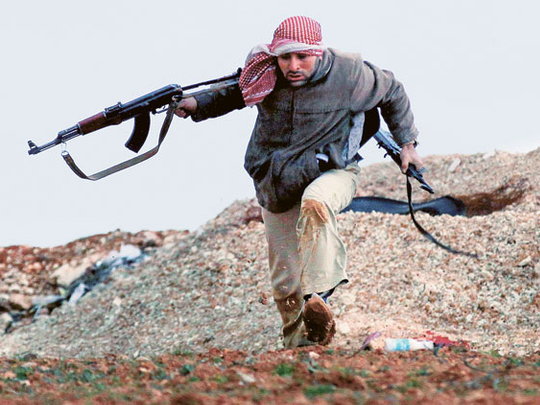
Damascus: The Syrian flag flying over the modern grey Ministry of Interior building in Harasta is a little frayed at the edge, a little worse for wear.
On the street below, traffic is going nowhere at any speed. Soldiers carefully check everyone's identity and search cars. A drab olive-green tank is parked at the side of the road. And behind sandbag emplacements, other soldiers man machine guns.
Harasta, Saqba, Hammouriya and Kfar Batna are under virtual lock-down these past two weeks. That was when the military moved in, clearing out Free Syria Army rebels in an operation that involved 50 tanks and 2,000 troops. It's believed that at least 20 people were killed in the fighting then, but it's hard to verify numbers when official accounts vary widely from those who witnessed the events.
Military officials have commandeered city buses to move the troops around. The city buses are lime-green and don't quite match the drab olive-green of the tanks and armoured personnel carriers stationed strategically in the eastern suburbs.
Checkpoints
Four car wash bays have been turned into a makeshift encampments for some soldiers. They roll up mattresses and are moving out — on a city bus — back to a base where they won't have to lie in the washing bays.
At every street corner of importance there are checkpoints. It's impossible to drive 500 metres without being stopped and searched. And as the soldiers go about their duties, schoolchildren stop and watch in young wonder at the events unfolding before their eyes.
"What you want here?" one sergeant barks. "Why you come here?"
That's an easy question to answer.
"Business," comes the answer.
"You have no business here."
‘No pictures'
In many ways, if the military wasn't there, neither would the press, but that's a logic that's too hard to explain at the checkpoint outside a shawarma shop with a shot-out window.
At another checkpoint, a young unshaven soldier with a mouthful of brown and decaying teeth toothily smiles: "Welcome to Syria."
And at a third checkpoint, a Soviet-era tank is idling, rattling and spewing diesel fumes as its crew work on the open engine compartment.
"No pictures," an officer barks. Then he stands and offers a pose of himself rather than the vehicle.
Where major streets meet, there are sandbag emplacements, young men in various states of combat uniform manning their weapons. Some wear long belts of machine gun bullets strung around their necks and torsos.
What anti-government graffiti had been daubed on shops and walls has since been painted over, and some printer somewhere in Damascus has a nice little number going, running off posters of President Bashar Al Assad by the thousands. Everywhere he is posted, the same stoney stare beside a Syrian flag. He's even stuck to the lime-green commandeered city buses.
Along the highway to Saqba, old and new furniture is being peddled. Beside the sofas and wardrobes and bedroom sets, a machine-gunner scans the roadway, standing sentinel over a checkpoint into the suburb. Two grey and blue camouflaged soldiers carefully search every car and scrutinise identity papers.
"Have a nice day," one says, having obviously watched too many North American soap operas on television somewhere in his past.
But the residents of Saqba are not having a nice day. It takes 30 minutes to get into the sealed-off suburb, and almost as long to leave. A light truck is carrying freshly-slaughtered sheepskins, smelly, drawing flies, and dripping fresh blood onto the potholed and rutted road.
Newer weapons
It's not the only blood spilled here.
"There were four terrorists shot on this street," one coffee vendor says as he taps grinds into a street-side expresso machine.
Elsewhere, at another checkpoint outside a building in a compound where men in suits come and go unchecked through darkened doors, a dozen or so men with the same neat haircuts, leather jackets and almost the same heavy moustaches man their posts.
Their weapons are newer, polished, without the blemishes carried by regular troops. One even has a pistol sticking from his waistband, its grip emblazoned with a metal decoration.












